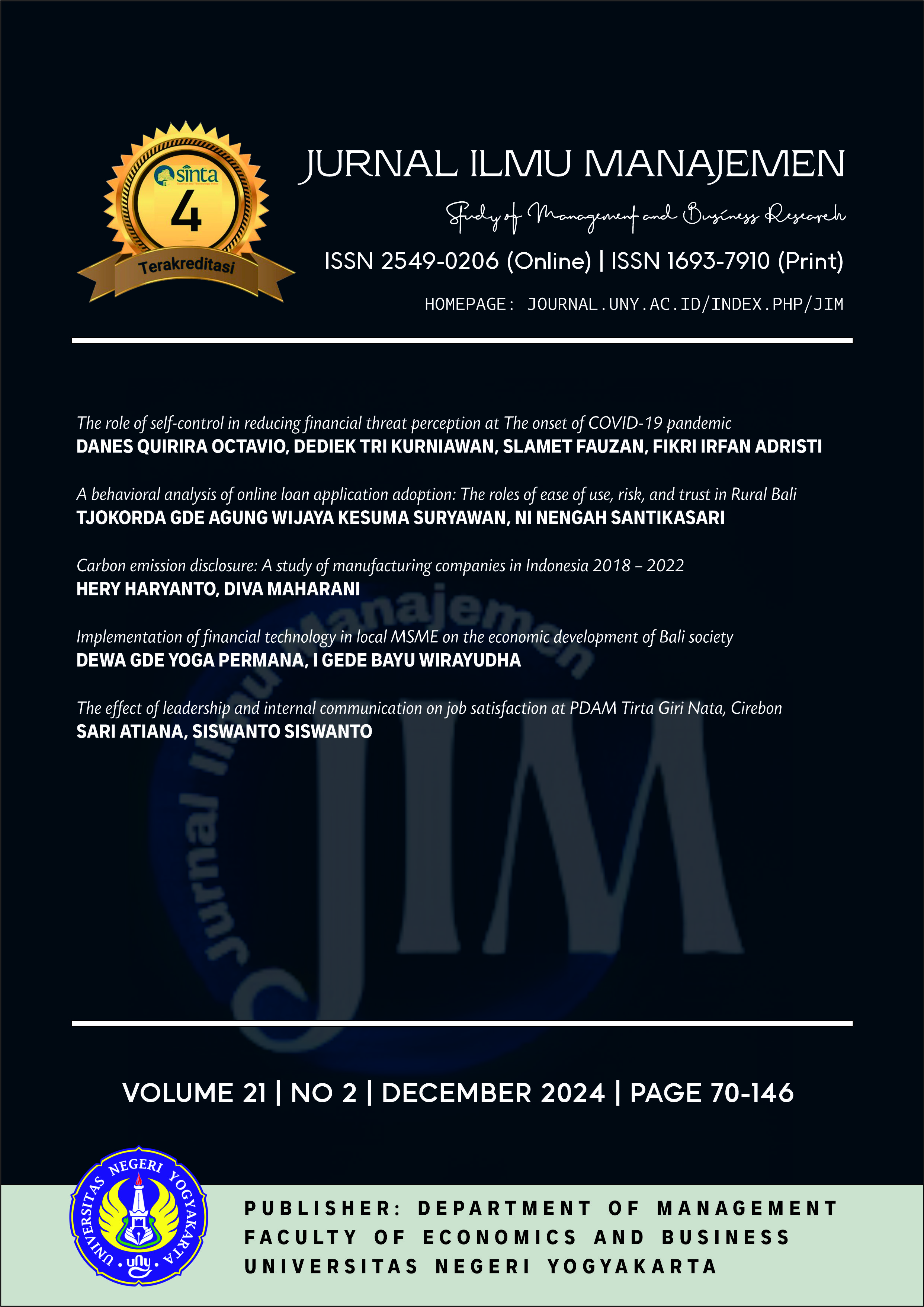The role of self-control in reducing financial threat perception at The onset of COVID-19 pandemic
DOI:
https://doi.org/10.21831/jim.v21i2.75027Abstract
In this study we attempt to understand how people manage their condition during uncertainty, such as the economic crisis induced by the Covid-19 pandemic. In short, we analyze the relationship between self-control, good financial behavior, and financial threat perception at the onset of the Covid-19 pandemic. A web-based survey was conducted to collect the sample (n = 589) in Indonesians people. This study found that self-control not only encourages good financial behavior but also reduces financial threat perception in the middle of uncertainty. However, good financial behavior cannot mediate the effect of self-control and financial threat perception. Our study provides evidence that at the onset of a financial crisis, self-control is needed to cope with acute stress that arises from sudden uncertainty. Having good financial behavior cannot fully alleviate financial threat perception. Self-control has a direct mechanism in coping with financial threats during COVID-19.
Keywords: personal finance; self-control; Covid-19; pandemic; financial stress
References
Ameriks, J., Caplin, A., & Leahy, J. (2003). Wealth accumulation and the propensity to plan. Quarterly Journal of Economics, 118(3), 1007–1047. https://doi.org/10.1162/00335530360698487
Aravindan, A., & Geddie, J. (2020). Singapore economy enters recession, second quarter GDP plunges record 41.2%. Www.Thejakartapost.Com. https://www.thejakartapost.com/news/2020/07/14/singapore-economy-enters-recession-second-quarter-gdp-plunges-record-412.html
Baron, R. M., & Kenny, D. A. (1986). The Moderator-Mediator Variable Distinction in Social Psychological Research. Conceptual, Strategic, and Statistical Considerations. Journal of Personality and Social Psychology, 51(6), 1173–1182. https://doi.org/10.1037/0022-3514.51.6.1173
Baumeister, R. F. (2002). Yielding to Temptation: Self"Control Failure, Impulsive Purchasing, and Consumer Behavior. Journal of Consumer Research, 28(4), 670–676. https://doi.org/10.1016/s0098-7913(78)80071-9
Biljanovska, N., & Palligkinis, S. (2016). Control thyself: Self-control failure and household wealth. Journal of Banking and Finance, 92, 280–294. https://doi.org/10.1016/j.jbankfin.2016.10.010
Camp, N., Fernandes Ramos, A. C., Hunter, K., Boat, R., & Magistro, D. (2023). Differences in self-control, self-efficacy and depressive symptoms between active and inactive middle-aged and older adults after 1 year of COVID restrictions. Aging and Mental Health, 27(3), 483–488. https://doi.org/10.1080/13607863.2022.2046691
Cao, Y., & Li, H. (2022). Toward controlling of a pandemic : How self-control ability influences willingness to take the COVID-19 vaccine. Personality and Individual Differences, 188(July 2021), 111447. https://doi.org/10.1016/j.paid.2021.111447
Deaton, A. (2012). The financial crisis and the well-being of Americans. Oxford Economic Papers, 64(1), 1–26. https://doi.org/10.1093/oep/gpr051
Fernandes, D., Lynch, J. G., & Netemeyer, R. G. (2014). Financial literacy, financial education, and downstream financial behaviors. Management Science, 60(8), 1861–1883. https://doi.org/10.1287/mnsc.2013.1849
Fitch, C., Hamilton, S., Bassett, P., Davey, R., Fitch, C., Hamilton, S., Bassett, P., & Davey, R. (2014). The relationship between personal debt and mental health : a systematic review. https://doi.org/10.1108/13619321111202313
Gathergood, J. (2012). Self-control , financial literacy and consumer over-indebtedness. Journal of Economic Psychology, 33(3), 590–602. https://doi.org/10.1016/j.joep.2011.11.006
Guven, C. (2012). Reversing the question: Does happiness affect consumption and savings behavior? Journal of Economic Psychology, 33(4), 701–717. https://doi.org/10.1016/j.joep.2012.01.002
Helliwell, J., Layard, R., Sachs, J., & De Neve, J. (2020). World Hapiness Report 2020. In University of Oxford: Wellbeing Research Centre. https://worldhappiness.report/
Idris, M. (2020). Mulai 1 Juni, Ini Skenario Tahapan New Normal untuk Pemulihan Ekonomi. Kompas.Com.
Jenkins, R., Bhugra, D., Bebbington, P., Brugha, T., Farrell, M., Coid, J., Fryers, T., & Weich, S. (2008). Debt , income and mental disorder in the general population. 1485–1493. https://doi.org/10.1017/S0033291707002516
Kahneman, D., & Tversky, A. (1979). Prospect Theory: An Analysis of Decision under Risk. Econometrica, 47(2), 263–292.
Karunia, A. M. (2020a). Dampak Covid-19, Menaker: Lebih dari 2 Juta Pekerja Di-PHK dan Dirumahkan. Kompas.Com.
Karunia, A. M. (2020b). Dirut Bulog Akui Harga Sembako Mulai Mahal Akibat Wabah Covid-19. Kompas.Com.
Kim, G. J., & Hanna, S. D. (2017). Do Self-Control Measures Affect Saving Behavior ? Journal of Personal Finance, September 2017.
Ling, Y., Gao, B., Jiang, B., Zhu, S., & Jiang, Y. (2024). Self-control and bed procrastination as mediators between mindfulness and sleep quality among college students during the COVID-19 pandemic. Scientific Reports, 14(1), 1–10. https://doi.org/10.1038/s41598-024-68591-5
Lusardi, A. (2012). Numeracy, Financial Literacy, and Financial Decision-Making. Numeracy, 5(1). https://doi.org/10.5038/1936-4660.5.1.2
Marjanovic, Z., Greenglass, E. R., Fiksenbaum, L., & Bell, C. M. (2013). Psychometric evaluation of the Financial Threat Scale (FTS) in the context of the great recession. Journal of Economic Psychology, 36(June), 1–10. https://doi.org/10.1016/j.joep.2013.02.005
Mirowsky, J., & Ross, C. E. (2001). Age and the Effect of Economic Hardship on Depression. Journal of Health and Social Behavior, 42(2), 132–150.
Modigliani, F., & Brumberg, R. (1954). Utility analysis and the consumption function: An interpretation of cross-section data. In The Collected Papers of Franco Modigliani (Vol. 6, pp. 3–45). https://doi.org/10.7551/mitpress/9780262027960.003.0007
Rha, J. Y., Montalto, C. P., & Hanna, S. D. (2006). The effect of self-control mechanisms on household saving behavior. Journal of Financial Counseling and Planning, 17(2), 3–16.
Roberts, J. A., & Manolis, C. (2012). Cooking up a recipe for self-control: The three ingredients of self-control and its impact on impulse buying. Journal of Marketing Theory and Practice, 20(2), 173–188. https://doi.org/10.2753/MTP1069-6679200204
Rosenbaum, M. (1989). Self-control under stress: The role of learned resourcefulness. Advances in Behaviour Research and Therapy, 11(4), 249–258. https://doi.org/10.1016/0146-6402(89)90028-3
Rosenbaum, M. (1993). The three functions of self-control behaviour: Redressive, reformative and experiential. Work and Stress, 7(1), 33–46. https://doi.org/10.1080/02678379308257048
Schnell, T., & Krampe, H. (2020). Meaning in Life and Self-Control Buffer Stress in Times of COVID-19 : Moderating and Mediating Effects With Regard to Mental Distress. Frontier in Psychiatry, 11(September), 1–16. https://doi.org/10.3389/fpsyt.2020.582352
Shefrin, H. M., & Thaler, R. H. (1988). The Behavioral Life"Cycle Hypothesis. Economic Inquiry, 26(4), 609–643. https://doi.org/10.1111/j.1465-7295.1988.tb01520.x
Strí¶mbäck, C., Lind, T., Skagerlund, K., Västfjäll, D., & Tinghí¶g, G. (2017). Does self-control predict financial behavior and financial well-being? Journal of Behavioral and Experimental Finance, 14, 30–38. https://doi.org/10.1016/j.jbef.2017.04.002
Suryahadi, A., Izzati, R. Al, & Suryadarma, D. (2020). The Impact of COVID-19 Outbreak on Poverty : An Estimation for Indonesia. SMERU Working Paper, April.
Voanews.com. (2020). US Officially in Recession, Economic Panel Declares. VOA News.
Wijayaatmaja, Y. P. (2020). Lima Bulan Pandemi Covid-19, Kriminalitas Naik 7 Persen. Media Indonesia.
Downloads
Published
How to Cite
Issue
Section
License
An author who publishes in the journal "Jurnal Ilmu Manajemen (JIM)" agrees to the following terms:
Author retains the copyright and grants the journal the right of first publication of the work simultaneously licensed under the Creative Commons Attribution-ShareAlike 4.0 License that allows others to share the work with an acknowledgement of the work's authorship and initial publication in this journal.
Author is able to enter into separate, additional contractual arrangements for the non-exclusive distribution of the journal's published version of the work (e.g., post it to an institutional repository or publish it in a book) with the acknowledgement of its initial publication in this journal.
Author is permitted and encouraged to post his/her work online (e.g., in institutional repositories or on their website) prior to and during the submission process, as it can lead to productive exchanges, as well as earlier and greater citation of the published work (See The Effect of Open Access).
All materials in this site are protected by the law. It is prohibited to quote a part of or all of this website contents for commercial purposes without the permission or consent of the editors.
If anyone finds one article or more in this journal violate or potentially violate one's copyrights, please report to us through e-mail of Principle Contact.
Legal-formal aspects of accessing any information and manuscript in this journal website refer to the provision of license Creative Commons Attribution-Share Alike (CC BY-SA). Read more about the Creative Commons Attribution-ShareAlike 4.0 Licence here: https://creativecommons.org/licenses/by-sa/4.0/.
All information available in 'Jurnal Ilmu Ekonomi (JIM)' is academic in nature. 'Jurnal Ilmu Ekonomi (JIM)' is not responsible for loss due to the abuse of information in the website.



.png)

